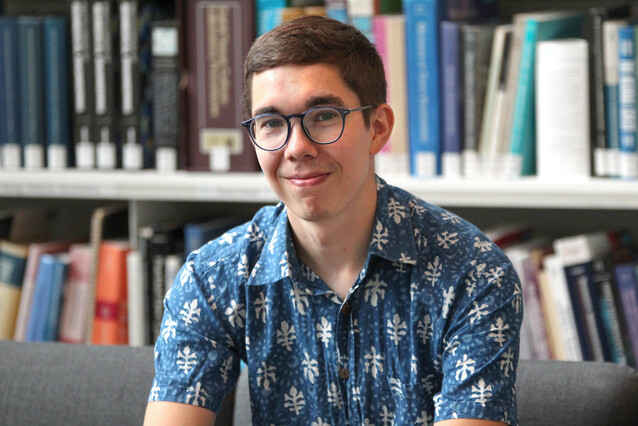DOC Fellowship for David Hollaus
The Austrian Academy of Sciences (ÖAW) has awarded one of its competitive DOC Fellowships to David Hollaus, PhD student at the lab of Moritz Gaidt at the IMP. The funding will support his research on the protein MORC3 and its interactions with DNA viruses.
David Hollaus, PhD student with Moritz Gaidt at the IMP, has been awarded a prestigious and competitive two-year DOC Fellowship by the Austrian Academy of Sciences (ÖAW) to study the interactions between the human protein MORC3 and DNA viruses.
The innate immune system—our body's first line of defence–can recognise and respond to viruses effectively by initiating protective measures to neutralise and eliminate them from the body. This involves the actions of various proteins that can detect viral components and trigger immune responses to combat the viral infection.
David Hollaus’ PhD research focuses on the human protein MORC3 and its interactions with DNA viruses–a type of virus that stores its genetic information in DNA. MORC3 can effectively inhibit viral spread by tightly wrapping up the viruses’ DNA, stopping the infection from progressing any further. To get around this defence however, viruses employ specific proteins to block MORC3’s disruptive action. As a backup, MORC3 also helps control type I interferons—a group of proteins produced by cells in response to viral infections that can boost the body’s defences. When viruses block MORC3, it triggers a strong release of these interferons, aiding in the detection and combat of the virus. By using a combination of genetic tools and RNA sequencing, David Hollaus aims to discover the molecular mechanisms underlying the interactions between MORC3 and DNA viruses.
David Hollaus joined the lab of Moritz Gaidt in 2022. He graduated with honours in both his M.Sc. in Biomolecular Sciences from the Vrije Universiteit Amsterdam, and his double degree B.Sc. in Biological Chemistry from the Johannes Kepler Universität Linz. Hollaus received several merit-based scholarships and study awards, while his laboratory work was recognised by the “Outstanding bachelor thesis award” of the University of South Bohemia in Budweis and led to two co-authorships in the journal Nature communications.
DOC Fellowships of the Austrian Academy of Sciences (ÖAW) are awarded every year to highly qualified doctoral candidates in any area of basic research. The scholarship enables young researchers to fully dedicate themselves to the preparation of their doctoral thesis in a focused manner, and with a clear time frame.
Related links:
